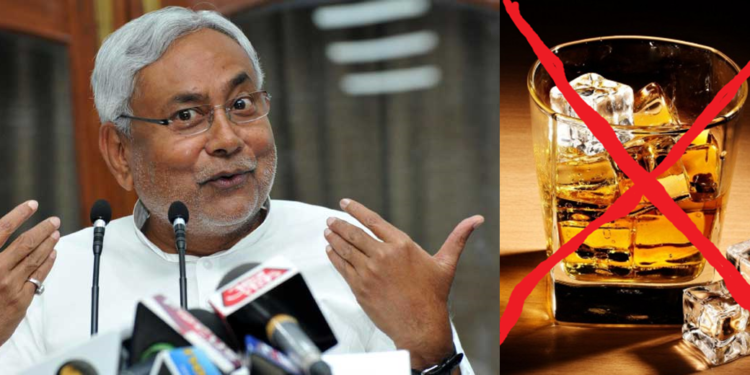On 26th November, Chief Minister Nitish Kumar had announced a liquor ban in Bihar with effect from 1st April, 2016. Now intentions may be good here but then a ban is something which is the easiest thing to do and now it has become a fashion to ban anything which is not liked by the men in power.
Since it is done by the poster boy of anti Modi camp, intolerance debate on alcohol consumption hasn’t erupted yet but in reality this culture of ban seems to the biggest curse for India whosoever may be demanding those.
Being Indians, it is important for us to understand the cultural ethos of our country which never ever believed in the culture of ban, we can’t find a single sentence in any of the epics/puranas which suggests a ban like action.
This is because in India, we believe it is the right of one to live his/her life according to his /her idea of what is right. This idea of right is not written in any holy book but it is one’s own realization of what is right and what is wrong.
Consumption of alcohol is one’s personal choice, it is similar to consuming meat, for which we had witnessed so much of uproar last few months. Hence like all other liberals, I feel it will be better not to come with another ban but to find ways and means to fight alcohol addiction.
We need to clearly understand the difference between alcohol consumption and alcohol addiction. Consumption of alcohol is in no way a taboo in our society in the past or present. But alcohol addiction is a major issue affecting not just the lives of people in Bihar but in many other states too.
Hence what we need is awareness on alcohol addictions and facilities to treat alcohol addicts. Ban will only create an opportunity for illegal alcohol business which will create many more criminals and more spurious alcohol in the market, endangering lives of innocent people.
Now coming back to Bihar, Mr. Tyagi, National Spokes person of JD (U) believes that the declared ban will work in Bihar like it worked in Gujarat.
Unlike many states who implemented liquor ban, Gujarat is the only state where prohibition has been successful in terms of being at least a law in force without repealing.
But even in Gujarat, availability of liquor has never been a problem due to the availability of well networked bootleggers. During 2014 elections, EC had seized liquor worth Rs.10 cr from Gujarat, if some news reports were to be believed. This reflects the ineffectiveness of a law which even has provisions for awarding death penalty. Despite the liquor ban, Gujaratis are known to use non-official lines to drink alcohol and are known to be largest consumers of alcohol within the country ( there is official stats for this). Which means the state is losing the tax revenue, not able to impose any controls and leads to higher crime rates.
despite the ban, Gujaratis are known to use non-official lines to drink alcohol and are known to be largest consumers of alcohol within the country ( there is official stats for this). Which means the state is losing the tax revenue, not able to impose any controls and leads to higher crime rates!
If we take the examples of Mizoram, Tamil Nadu or Manipur, they had brought in liquor ban to realize later that it creates major headache, in terms of availability of spurious liquor and bootlegging. In fact the liquor ban, in a way results in deeper penetration of liquor in to the society as it becomes a home delivery business and involvement of criminal gangs makes illegal liquor business a major head ache for the state.
For the credit of Gujarat, illegal liquor business has never been a major law and order problem for the state. Even alcohol addiction has never been considered a major threat to Gujarat. But then Gujarat has always been a prosperous state where unemployment and poverty has never been that grave as it is in Bihar.
But when it comes to a state like Bihar, we need to understand that, a large percentage of population is still living under the bracket of being poor with most of them being unemployed or under employed and law and order situation in the state has always been considered to be one of the worst in India and the state is infamously known for its criminal gangs.
According to “National Crime Records Bureau” Bihar is a State where there has been a constant increase in the cases relating to abduction and kidnapping, during 2003 there were about 674 cases reported and by 2013 it had become 4419.
Now a ban on liquor throws up a big opportunity to these gangs, who can make serious money out of sale of spurious liquor or smuggled liquor and they will be able to attract large number of unemployed youth to bootlegging and other illegal liquor related business.
Similarly, according to few estimates, the ban will result in foregoing of whopping Rs 4000/- crore or so from tax collections, which is roughly estimated at about 15% of total tax collections, a big loss indeed for the state of Bihar.
Further, liquor ban s have always had a negative impact on tourism prospects and for an economically weaker state like Bihar, to not take the advantage of growing tourism prospects of India, will be a big opportunity to forgo.
Hence for Bihar, liquor ban can wait and priority should be given to providing employment by working closely with centre and attracting major infrastructure and other employment generating projects and state should focus on building an efficient policing or law enforcement system to start with.
And in order to deliver on the promise made by Nitish Kumar to women voters, instead of doing the easiest thing of ban, he should open up rehabilitation centers across state and use JD (U) / RJD party cadres and government machinery to run a statewide anti alcohol consumption campaign.
All in all the decision seems to be too early for the benefit of Bihar, it will be better if Nitish Kumar revisits his decision or all the good intentions in bringing in the prohibition will turn out to be the biggest gift from Nitish Kumar to all the criminal gangs and their political and administrative bosses




























